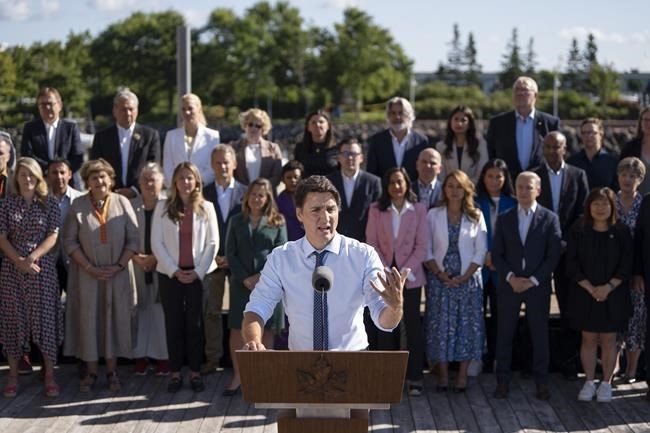CHARLOTTETOWN — The federal Liberal cabinet wrapped up a three-day retreat in Prince Edward Island on Wednesday promising to heed calls from Canadians to fix the housing crisis, but without any specific new plans to do so.
Prime Minister Justin Trudeau and most of his 38 cabinet ministers gathered this week at a hotel on the Charlottetown waterfront, where they were briefed by policy wonks about what is causing the housing affordability crisis and by housing experts about what government can specifically do to fix it.
But their main message at the end of the retreat was to tell Canadians to stay tuned.
"We are looking forward to continue to do the work we've been doing on housing and do even more," Trudeau said, with ministers on a set of risers behind him.
"We recognize and Canadians know that there's not one silver bullet that's going to solve the housing challenges."
This cabinet retreat came at the end of a summer when Liberal poll numbers lost ground to the Conservatives and leader Pierre Poilievre, whose message that under Trudeau everything in Canada is broken appeared to be resonating.
Poilievre repeated that message Wednesday while placing blame for Canada's rising cost of living on Trudeau.
"We have never seen it like this before and we were supposed to have solutions out of this big housing retreat Trudeau held," Poilievre said in Ottawa.
"What was the solution? More speeches, more photo ops, more puff pieces for his incompetent housing minister."
Trudeau dismissed Poilievre as an unserious critic whose response to the fears and anxieties Canadians are living with post-pandemic is to deliver "slogans and buzzwords" without any practical solutions.
His government, Trudeau insisted, is taking the housing problem seriously and will work in collaboration with provinces, municipalities, homebuilders and non-profit agencies to respond.
"This government is focused on getting more housing built," he said.
But neither he nor his ministers would say how, despite repeatedly being pressed for specifics by reporters.
"Canadians have been clear about what they need, what they expect and what's their concern," Industry Minister François-Philippe Champagne said Wednesday.
"We've been talking for the last two days, we've been talking to experts looking at different policy options, and now it's all about action, action, action."
But when pressed on what that action would be, he said more discussions were needed before deciding on the right moves.
The housing problem is a complex mix of issues based heavily in the fact that the supply of new homes is not keeping up with demand from a rapidly growing population.
A new Leger poll suggests four in 10 Canadians blame the Trudeau government for the housing crisis, while about three in 10 blame their province.
The Canada Mortgage and Housing Corporation estimates Canada is on track to build about 2.3 million new housing units by 2030, but to bring the market back to an affordable range that needs to more than double to 5.8 million.
Trudeau said doubling construction plans is what the government aims to do.
A report presented to the cabinet this week lists 10 things the federal government can do on housing, including cutting federal sales taxes on new rental construction and issuing a new federal benefit to Canadians who are at risk of becoming homeless.
The report noted that more research is needed to determine the effect on housing from immigration, including an influx of international students in the last two years.
There were 800,000 international students in Canada in 2022, almost twice what had been forecast in the government's long-term plan in 2014.
Co-author Mike Moffatt, an economist and founding director of the PLACE Centre at the Smart Prosperity Institute, said in the London, Ont., neighbourhood where he grew up — more than six kilometres from the nearest post-secondary school — what used to be family homes are increasingly filled with students.
But Moffatt said one cannot, and should not, blame international students or immigrants, noting they too have a right to housing and it's not up to them to make sure it exists.
Immigration Minister Marc Miller and Housing Minister Sean Fraser floated the notion of capping the issuance of international student permits as a measure of control, but did not commit to doing so.
Trudeau said housing problems have been growing over the decades, and fingers have been pointed in the past at foreign buyers, immigrants, overly aggressive developers and underfunding by governments.
He stressed a need to be careful in assigning blame.
The solutions, he said, lie in understanding the roots of the problem and then putting appropriate remedies in place.
This report by The Canadian Press was first published Aug. 23, 2023.
Mia Rabson, The Canadian Press



